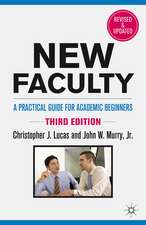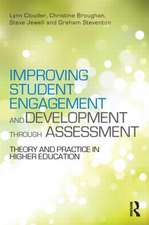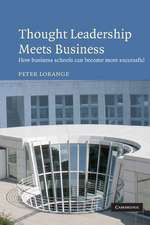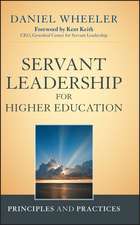The Business School in the Twenty-First Century: Emergent Challenges and New Business Models
Autor Howard Thomas, Peter Lorange, Jagdish Shethen Limba Engleză Hardback – 17 iul 2013
Preț: 450.27 lei
Preț vechi: 505.92 lei
-11% Nou
Puncte Express: 675
Preț estimativ în valută:
86.19€ • 93.65$ • 72.44£
86.19€ • 93.65$ • 72.44£
Carte tipărită la comandă
Livrare economică 21 aprilie-05 mai
Preluare comenzi: 021 569.72.76
Specificații
ISBN-13: 9781107013803
ISBN-10: 1107013801
Pagini: 292
Ilustrații: 16 b/w illus. 17 tables
Dimensiuni: 152 x 231 x 23 mm
Greutate: 0.57 kg
Ediția:New.
Editura: Cambridge University Press
Colecția Cambridge University Press
Locul publicării:New York, United States
ISBN-10: 1107013801
Pagini: 292
Ilustrații: 16 b/w illus. 17 tables
Dimensiuni: 152 x 231 x 23 mm
Greutate: 0.57 kg
Ediția:New.
Editura: Cambridge University Press
Colecția Cambridge University Press
Locul publicării:New York, United States
Cuprins
Preface: tipping or tripping? The business school and its dilemmas; 1. The business school: history, evolution and the search for legitimacy; 2. Business school identity and legitimacy: its relationship to the modern university and society; 3. Rethinking management education and its models: a critical examination of management and management education; 4. A framework for re-evaluating paradigms of management education; 5. Evaluating new and innovative models of management education; 6. Is the business school a professional firm? Lessons learned; 7. Enhancing dynamic capabilities in the business school: improving leadership capabilities in curricula and management; 8. Afterword: business school futures; Index.
Recenzii
'Lorange, Sheth and Thomas provide a comprehensive, data-filled overview of the business school landscape including its history and current conditions. With an appropriately broad focus on schools throughout the world, and by considering what skills business schools should impart to their students and how they might accomplish this, this book is one of the very best overviews of the business school ecosystem.' Jeffrey Pfeffer, Thomas D. Dee, II Professor of Organizational Behavior, Stanford University
'The timing of this book could not be better as the world of business education is facing the greatest challenges and opportunities in its history. More than ever, business schools have to deal with new players, new models of competition, new technology, a new generation of teachers and participants, a new global environment etc. The book is full of ideas and insights that I expect will contribute fundamentally to the rethinking of our current business models. It is without question the most important and useful book on what business education will look like tomorrow.' Dominique Turpin, President and Nestlé Professor, IMD
'As highly experienced business school educators, the authors are uniquely qualified to offer a credible new framework for evaluating educational practices. Their observations regarding research and curricula relevance, faculty appointments and workloads, current funding sources, globalization of business education, and the impact of technological advancements are insightful and intriguing. This book is a worthy read for anyone who is interested in how we educate the next generation of business leaders.' Thomas S. Robertson, Dean and Reliance Professor of Management and Private Enterprise, University of Pennsylvania
'In today's global and complex world, governments and companies need quality leadership to understand the challenges that we face, set a sense of direction, inspire others through example and execute action plans. Business schools were born as institutions to provide a learning context to develop leaders with clear thinking and values-based character to make things happen. This new book provides useful suggestions on how business schools can better contribute to business and society through leadership development.' Jordi Canals, Dean, IESE Business School
'This book makes a huge contribution to executive education, mainly due to its having an icon in this field among its authors, Peter Lorange. It will help business schools to review their mission and their role vis-à-vis society.' Emerson Almeida, President, Fundacao Dom Cabral, Brazil
'Lorange, Sheth and Thomas have written an insightful and thought-provoking analysis of the past, present and future of business schools, outlining the choices schools will face and strategic decisions they must make to thrive in the twenty-first century.' Kai Peters, CEO, Ashridge Management College
'At a time when, faced with globalization and digital development, everyone agrees in saying that business schools will have to redefine themselves to survive, Howard Thomas, Peter Lorange and Jagdish Sheth actually propose some clear, concrete directions. This book should greatly interest both people who are skeptical about business schools and those who unconditionally support them.' Bernard Ramanantsoa, Dean, HEC, Paris
'The performance of American business schools is coming under increasing scrutiny and skepticism, fueled in no small part by the unethical behavior of some their high-profile graduates. The schools themselves are being characterized as academic cash cows whose faculties suffer from physics envy. At the same time, the demand for business degrees has soared as the skyrocketing costs of a higher education drive parents to tell their offspring to use their undergraduate years as the means to a good job (as opposed to a good education). Meanwhile graduate school professors are teaching less while delivering their product for free on-line … As the authors of this remarkable compendium … conclude, the enterprise is now at a tipping (if not tripping) point. Their unprecedented, comprehensive, global perspective on the challenges facing business schools is scholarly, even-handed, and admirably practical.' James O'Toole, Daniels Distinguished Professor of Business Ethics, University of Denver
'The timing of this book could not be better as the world of business education is facing the greatest challenges and opportunities in its history. More than ever, business schools have to deal with new players, new models of competition, new technology, a new generation of teachers and participants, a new global environment etc. The book is full of ideas and insights that I expect will contribute fundamentally to the rethinking of our current business models. It is without question the most important and useful book on what business education will look like tomorrow.' Dominique Turpin, President and Nestlé Professor, IMD
'As highly experienced business school educators, the authors are uniquely qualified to offer a credible new framework for evaluating educational practices. Their observations regarding research and curricula relevance, faculty appointments and workloads, current funding sources, globalization of business education, and the impact of technological advancements are insightful and intriguing. This book is a worthy read for anyone who is interested in how we educate the next generation of business leaders.' Thomas S. Robertson, Dean and Reliance Professor of Management and Private Enterprise, University of Pennsylvania
'In today's global and complex world, governments and companies need quality leadership to understand the challenges that we face, set a sense of direction, inspire others through example and execute action plans. Business schools were born as institutions to provide a learning context to develop leaders with clear thinking and values-based character to make things happen. This new book provides useful suggestions on how business schools can better contribute to business and society through leadership development.' Jordi Canals, Dean, IESE Business School
'This book makes a huge contribution to executive education, mainly due to its having an icon in this field among its authors, Peter Lorange. It will help business schools to review their mission and their role vis-à-vis society.' Emerson Almeida, President, Fundacao Dom Cabral, Brazil
'Lorange, Sheth and Thomas have written an insightful and thought-provoking analysis of the past, present and future of business schools, outlining the choices schools will face and strategic decisions they must make to thrive in the twenty-first century.' Kai Peters, CEO, Ashridge Management College
'At a time when, faced with globalization and digital development, everyone agrees in saying that business schools will have to redefine themselves to survive, Howard Thomas, Peter Lorange and Jagdish Sheth actually propose some clear, concrete directions. This book should greatly interest both people who are skeptical about business schools and those who unconditionally support them.' Bernard Ramanantsoa, Dean, HEC, Paris
'The performance of American business schools is coming under increasing scrutiny and skepticism, fueled in no small part by the unethical behavior of some their high-profile graduates. The schools themselves are being characterized as academic cash cows whose faculties suffer from physics envy. At the same time, the demand for business degrees has soared as the skyrocketing costs of a higher education drive parents to tell their offspring to use their undergraduate years as the means to a good job (as opposed to a good education). Meanwhile graduate school professors are teaching less while delivering their product for free on-line … As the authors of this remarkable compendium … conclude, the enterprise is now at a tipping (if not tripping) point. Their unprecedented, comprehensive, global perspective on the challenges facing business schools is scholarly, even-handed, and admirably practical.' James O'Toole, Daniels Distinguished Professor of Business Ethics, University of Denver
Notă biografică
Descriere
Three world experts share their insights on designing the business school of the future, and how to make it work.












